|
|
|
Sort Order |
|
|
|
Items / Page
|
|
|
|
|
|
|
| Srl | Item |
| 1 |
ID:
128862
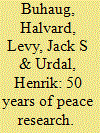

|
|
|
|
|
| Publication |
2014.
|
| Summary/Abstract |
Established in 1964, the Journal of Peace Research (JPR) celebrates 50 years. This anniversary special issue of the journal offers broad reviews of research areas that have been central both to the journal and to the field of peace and conflict research generally. An opening article co-authored by long-time editor Nils Petter Gleditsch offers a historical view on peace research and tracks trends in the use of 'peace' and 'violence' in titles of JPR across the first 49 volumes of the journal. Opening the review article section, two contributions address key thematic areas for the journal. Few if any subjects have attracted more attention in the study of international relations during the second half of JPR's first 50 years than the democratic peace, and in the extension of this subject, the broader debate about the liberal peace. Additional articles review the status and propose future developments in the study of war and its relationship with territory, ethnicity, ideology and natural resources. Another key historical topic associated with the journal concerns the economic cost of military conflict, while more recent research fields covered include terrorism and human rights, topics that have grown to become major JPR niches. Reflecting the methodological contributions by JPR, two articles focus on challenges of contemporary quantitative political analysis and progress in peace and conflict data collection. Finally, this special issue includes a review of research on international mediation in armed conflicts.
|
|
|
|
|
|
|
|
|
|
|
|
|
|
|
|
| 2 |
ID:
100944
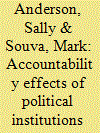

|
|
|
|
|
| Publication |
2010.
|
| Summary/Abstract |
Selectorate theory posits that leader accountability increases with the size of the winning coalition. Recent research contends that capitalism also increases leader accountability because leaders are more dependent on the public for revenue in more capitalist economies. The authors argue that extant tests of accountability arguments of interstate conflict initiation and targeting are flawed. Accountability theories of foreign policy expect leaders to selectively initiate disputes based on their probability of winning. Accountability arguments, then, expect a conditional relationship between the accountability mechanism and the balance of power. For example, if capitalism produces peace through accountability, then more capitalist states should be less likely to initiate militarized disputes as their power advantage decreases. The authors find that this is not the case. At the same time, the authors find robust support for selectorate theory's contention that larger winning coalitions are more selective about using military force. Political institutions induce accountability; capitalism does not.
|
|
|
|
|
|
|
|
|
|
|
|
|
|
|
|
| 3 |
ID:
096195
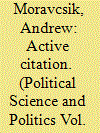

|
|
|
|
|
| Publication |
2010.
|
| Summary/Abstract |
Qualitative research dominates political science. In the field of international relations (IR), for example, about 70% of scholars primarily employ qualitative methods, compared to 21% favoring formal or quantitative analysis (Jordan et al. 2009). Since nearly all of the latter make secondary use of textual and historical methods, overall over 90% of IR scholars employ qualitative analysis, whereas 48% use any statistical and only 12% any formal methods. This understates the dominance of qualitative analysis, for many statistical data sets rest ultimately on historical work, and IR scholars, when polled, report that qualitative case studies are more relevant for policy than quantitative or formal work. Hardly any major IR debate-whether that over the end of the cold war, American unipolarity, Chinese foreign policy, the nature of European integration, compliance with international law, democratic peace, the causes of war, or the impact of human rights norms-remains untouched by important qualitative contributions.
|
|
|
|
|
|
|
|
|
|
|
|
|
|
|
|
| 4 |
ID:
057599
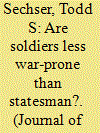

|
|
|
| 5 |
ID:
111969
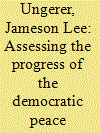

|
|
|
|
|
| Publication |
2012.
|
| Summary/Abstract |
This article analyzes the evolution of the democratic peace, beginning from the initial observation of a lack of wars and rarity of conflicts between democratic regimes to a number of competing and/or compatible explanations over the causality of the observed peace. A Lakatosian methodology is applied as a foundation for assessing the progress of the research program, according to the four traditionally recognized concepts: a hard core; a positive heuristic; a negative heuristic; and the auxiliary hypotheses. Theories are distinguished based on their theoretical and empirical progressiveness, as well as progressive intra-program problem-shifts. Explanations over the active causal process have often been seen as competitors, yet a Lakatosian framework enables seemingly inconsistent hypotheses to be grafted onto an existing research program, which can be determined to be progressive if they provide increased explanatory power and novel predictions that receive empirical corroboration. By these criteria, the research on capitalist development and the ongoing democratic peace research are not incompatible, provided that further additions to the research program ascertain the progressive criteria. Furthermore, by highlighting the areas that can best explain and predict the democratic peace phenomenon, the Lakatosian analysis offers insights for future progression in the field, as well as the areas upon which research should be focused.
|
|
|
|
|
|
|
|
|
|
|
|
|
|
|
|
| 6 |
ID:
158381
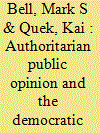

|
|
|
|
|
| Summary/Abstract |
The “democratic peace”—the regularity that democracies rarely (if ever) fight with other democracies but do fight with nondemocracies—is one of the most famous findings in international relations scholarship. There is little agreement, however, about the mechanism that underpins the democratic peace. Recently, scholars have shown that mass publics in liberal democracies are less supportive of using military force against other democracies. This finding has been taken to support the idea that the content of public opinion may provide one mechanism that underpins the democratic peace. Using a large-scale survey experiment, we show that mass publics in an authoritarian regime—China—show the same reluctance to use force against democracies as is found in western democracies. Our findings expand the empirical scope of the claim that mass publics are reluctant to use force against democracies, but force us to rethink how public opinion operates as a causal mechanism underpinning the democratic peace.
|
|
|
|
|
|
|
|
|
|
|
|
|
|
|
|
| 7 |
ID:
151281
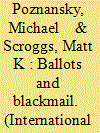

|
|
|
|
|
| Summary/Abstract |
Does the restraint that prevents pairs of democracies from fighting large-scale wars also prevent them from coercing one another? While scholars have long drawn a bright line between using force and threatening it, the literature on democratic-peace theory overwhelmingly emphasizes the former. Using a dataset uniquely suited for the study of militarized compellent threats, we find that pairs of democracies are significantly less likely to engage in coercive diplomacy than are other types of regimes. We employ a variety of estimators to ensure the robustness of our results; the finding holds in all cases. We also elaborate on several alternative logics that might account for the hypotheses. This allows us to adjudicate between a variety of mechanisms. Our findings reveal that democratic-peace theory has broader applicability than even proponents give it credit for: not only are democracies less likely to fight wars with one another, but they also prove less likely to threaten each other with force.
|
|
|
|
|
|
|
|
|
|
|
|
|
|
|
|
| 8 |
ID:
056680


|
|
|
| 9 |
ID:
137640
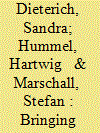

|
|
|
|
|
| Summary/Abstract |
Referring to Kant’s ‘Perpetual Peace’, research on the democratic peace is based on the assumption that citizens’ preferences are fully and directly transferred into actual security policy by democratic leaders. However, democratic responsiveness in foreign politics is a more complex issue. Parliaments are usually key institutions with regard to ensuring responsiveness of democratic leaders both by authorizing political decisions and by monitoring executive policymaking and implementation. However, in several democracies military security policy-making is understood as part of an ‘executive prerogative’. This article examines the role of parliaments in providing for democratic responsiveness of security policy-making. We test the hypothesis that, depending on the extent of their ‘war powers’, parliaments do effectively limit the scope of executive security policy if and when public opinion strongly opposes military action. The decision-making of 25 European democracies on military participation in the 2003 Iraq War serves as a test. Testing the hypothesis we find that countries with strong parliamentary war powers tended to be significantly less involved in the military intervention against Iraq. However, several puzzles of a theory of ‘parliamentary peace’ remain to be addressed by future research.
|
|
|
|
|
|
|
|
|
|
|
|
|
|
|
|
| 10 |
ID:
066346
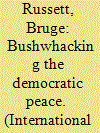

|
|
|
| 11 |
ID:
173765
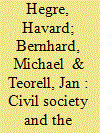

|
|
|
|
|
| Summary/Abstract |
We theorize that three distinct structures of democratic constraint explain why more democratic dyads do not engage in military conflict with each other. We build on earlier theories that focused on electoral and horizontal accountability. We add a new dimension—the social accountability provided by an active civil society. Using several new measures from the Varieties of Democracy (V-Dem) data set, we stringently test these explanations. We find social accountability to be the strongest and most consistent predictor of nonbelligerence in dyads, that horizontal accountability is still important, but that the independent role of electoral accountability has been somewhat overstated. However, we do find that social and electoral accountability work strongly together, to make for an even greater effect. The finding is robust to a range of specifications and in the face of controls for contending theories that challenge the democratic peace (e.g., the capitalist and territorial peace theories).
|
|
|
|
|
|
|
|
|
|
|
|
|
|
|
|
| 12 |
ID:
056143
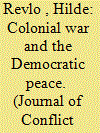

|
|
|
| 13 |
ID:
085439
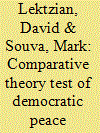

|
|
|
|
|
| Publication |
2009.
|
| Summary/Abstract |
Multiple theories posit the existence of a dyadic democratic peace. The authors extend the logic of three theories of the democratic peace - informational, normative, and preferences - and find that they make different predictions with respect to the onset and escalation of disputes across the range of similar regime dyads. First, regarding dispute onset, the preferences argument, but not the normative and informational arguments, expects autocratic dyads of similar type to have less conflict onset than mixed dyads.
|
|
|
|
|
|
|
|
|
|
|
|
|
|
|
|
| 14 |
ID:
065707
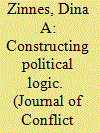

|
|
|
| 15 |
ID:
131004
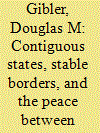

|
|
|
|
|
| Publication |
2014.
|
| Summary/Abstract |
Park and Colaresi find that border stability does not apply to non-contiguous states. This just confirms, again, an argument I have been making in numerous publications since my original "Bordering on Peace" article. Nevertheless, I use this response to present a replication of my original argument, as it applies to contiguous states, and I find strong support for the contention that the democratic peace can better be understood as a stable border peace. I also discuss several different replications of the original argument using different proxies for stable borders. Each confirms that joint democracy is not a statistically significant predictor of conflict once stable borders are also included in the model. In sum, arguments from the territorial peace have been confirmed in multiple analyses, with multiple data sets, using multiple levels of analysis, and this renders Park and Colaresi's attack on the original "Bordering on Peace" a non sequitur in the debate over stable borders as an explanation of democracy and peace.
|
|
|
|
|
|
|
|
|
|
|
|
|
|
|
|
| 16 |
ID:
087495
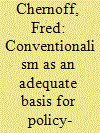

|
|
|
|
|
| Publication |
2009.
|
| Summary/Abstract |
This article considers three factual observations about the history of the study of International Relations and examines how well several different metatheories of IR can account for them. The three facts are, first, that there has been persisting disagreement between supporters of contending theoretical approaches; second, that there have been occasional cases in which opposing scholars have converged on certain conclusions; and third, that the field of IR was intended by its founders to have some bearing on policy and some capacity to help change the world. The article contrasts several well-known philosophical principles on which metatheories have been based. The article concludes that all three challenges can be met by only one such metatheory, which I term `causal conventionalism', based in part on principles developed a century ago by Pierre Duhem.
|
|
|
|
|
|
|
|
|
|
|
|
|
|
|
|
| 17 |
ID:
054358
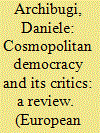

|
|
|
| 18 |
ID:
159858
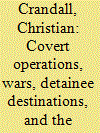

|
|
|
|
|
| Summary/Abstract |
We explore US covert forcible actions against democratic governments and their citizens and show that interdemocratic use of covert force is common and can be accommodated within the theory of democratic peace. Grounded in the Perceptual Theory of Legitimacy, we argue that democracies are constrained by public perceptions of their legitimacy from overtly aggressing against other democratic states. When democracies desire to aggress against their democratic counterparts, they will do so covertly. We test the assumptions of the theory and its implication with (1) laboratory studies of the conflation of democracy with ally status and (2) historical analyses of covert militarized actions and prisoner detention, which show that US forcible actions, when carried out against democracies and their citizens, are carried out clandestinely.
|
|
|
|
|
|
|
|
|
|
|
|
|
|
|
|
| 19 |
ID:
148044
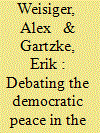

|
|
|
|
|
| Summary/Abstract |
In recent publications, we inquire whether the pacifying effects that are often attributed to democracy are likely to continue to hold as the world democratizes. Critics raise questions about the theoretical logic and especially the empirical results that we present. After clarifying our theoretical arguments, we discuss the central empirical critiques. We demonstrate that Crescenzi and Kadera’s (2016) finding of a pacifying effect of systemic democracy is driven not, as they claim, by the use of a better measure of systemic democracy, but by the unjustified decision to omit systemic regime difference from their analysis. Once we restore this variable, we find no evidence that democratization produces a system-level pacifying effect. We agree with our critics that the inclusion of dyadic regime difference produced misleading estimates for lower-threshold democracy. Because our arguments presume the historical existence of a dyadic democratic peace, however, this observation, if anything, resolves an apparent anomaly for our claims. Finally, we explain that Choi (2016) misunderstands the argument that systemic regime-type difference seeks to capture; we show that his proposed alternative neither captures our concept of interest nor accomplishes what he claims.
|
|
|
|
|
|
|
|
|
|
|
|
|
|
|
|
| 20 |
ID:
140076
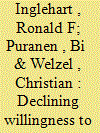

|
|
|
|
|
| Summary/Abstract |
The Democratic Peace thesis suggests that the absence of war between major powers since 1945 is caused by the spread of democracy. The Capitalist Peace thesis emphasizes trade and the rise of knowledge economies as the forces driving peace. Complementing these interpretations, we present empirical evidence of a cultural change that is making peace more desirable to the publics of most societies around the world. Analyzing public opinion data covering 90% of the world’s population over three decades, we demonstrate that improving existential conditions elevate the life opportunities of growing population segments and lead them to become increasingly tolerant of diversity and place growing emphasis on self-realization. In recognition of life’s rising opportunities, people’s valuation of life changes profoundly: readiness to sacrifice one’s life gives way to an increasing insistence on living it, and living it the way one chooses. Hence, pro-choice values rise at the same time as willingness to sacrifice lives in war dwindles. Historical learning based on the specific experiences of given societies has also changed their publics’ willingness to fight in wars. This transformation of worldviews places interstate peace on an increasingly solid mass basis.
|
|
|
|
|
|
|
|
|
|
|
|
|
|
|
|
|
|
|
|
|